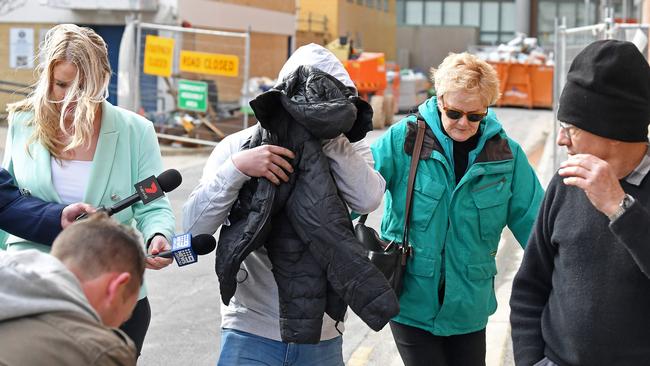From casino bar manager to jail cell: How Rohan Wakefield became SA’s first Operation Ironside arrest
He was managing an exclusive casino bar – so how did Rohan Wakefield end up with detectives at his door and a ute full of drugs, cash and hidden guns?
Police & Courts
Don't miss out on the headlines from Police & Courts. Followed categories will be added to My News.
Rohan Wakefield could feel his panic rising as he found detectives on his front step on the morning of January 12, 2020.
They had some awkward questions for the then-32-year-old about a large-scale methamphetamine laboratory found in rural NSW.
But Wakefield’s concerns were far more immediate. Metres from where he was talking with detectives was a ute crammed with firearms, ammunition and drugs.
Above all their heads were a bag of bullets hidden in the ceiling.
Once they had left, their questions still ringing in his ears, Wakefield picked up a Samsung mobile phone, pressed his thumb to the calculator icon and opened up the AN0M app – an encrypted communications platform being secretly monitored by Australian Federal Police.
Panicked messages went out to two men about the visit from the police. He was then told, in a nonchalant fashion, that he should expect the police to be back within a matter of hours – this time with a search warrant.
“The ute can’t be here then???!!!” Wakefield messaged in reply.
The white ute in his garage was not his, nor were the drugs and firearms hidden inside, but as is the case with drug runners, he was expecting to be left holding the bag when police walked in.

Wakefield furiously brainstormed with others over the app, discussing whether the ute should be moved or the guns and drugs buried.

In the end, he flushed the methamphetamine down his kitchen sink before washing the bags the drugs had come in and placing them in the bin.
As predicted, police returned and arrested Wakefield for several firearms hidden in the ute and drugs.
He was charged with possession of illegal firearms, ammunition and a silencer and trafficking in a controlled drug. He would become one of the first arrests directly linked to the largest law-enforcement investigation in Australian history – Operation Ironside.
Last week, barrister Andrew Culshaw, for Wakefield, posed a rhetorical to the Supreme Court: “How on earth did a man like Rohan Wakefield get mixed up in all this?”
More than a year before the arrest, Wakefield left his job as manager of the exclusive Chandelier Bar at the Adelaide Casino looking for a change.
A potential job at popular city bar Casablabla fell through and Wakefield was left living off his savings.

But then an offer came out of the blue. He could work for “two men looking to make money”.
Mr Culshaw said Wakefield instantly recognised that he was being led into something not entirely legal – but decided to go ahead anyway.
Soon he was ferrying loads of drugs around the city and storing items for the two men at his home.
Messages sent and received by Wakefield over the AN0M app – and released by the Supreme Court – show his house was a one-stop-shop for drug precursors and other illegal items.
The most damning was the ute full of guns found on January 12, 2020.
Two firearms – a sawn-off shotgun and a modified pistol – were found quickly by police.
Both were in poor condition, but a silencer found with the guns was in working order as was live ammunition found in the ute.
The ute was taken to a police compound and searched again.
Police located two rifles, two handguns and a revolver as well as more ammunition in two hidden compartments.

The compartment was so well hidden that Wakefield didn’t know it was there.
When police told him about the guns and that he would be charged with possessing them, he was stunned.
“I really wish I’d been informed that the ute had half of Australia’s weaponry inside it, I may have been less keen to store it along with the drugs,” Wakefield would text message shortly after being released on bail.
His final charges in the Supreme Court related to the sawn-off shotgun and handgun as well as the methamphetamine he flushed down the drain and the silencer and ammunition.
He was also charged with participation in a criminal organisation.
In November last year, Wakefield negotiated with prosecutors to drop the criminal organisation charge in exchange for guilty pleas to all other offences.

During sentencing submissions, Wakefield apologised to the court and his family for his offending, saying it had been committed while he was struggling with finances and his mental health.
Mr Culshaw said 15 character references forwarded to the court as well as his client’s clean criminal record showed he was a good candidate to serve any sentence on home-detention bail.
“Before Your Honour stands a good man,” he told Justice Adam Kimber.
Wakefield wiped tears from his face as Mr Culshaw praised him and described the offending as an aberration.
A prosecutor told the court Wakefield had been an “eager participant” in criminal activity and who was benefiting financially from the crimes of others.
The court heard Wakefield had refused to name any of the people he had been communicating with.
He will be sentenced next month.




